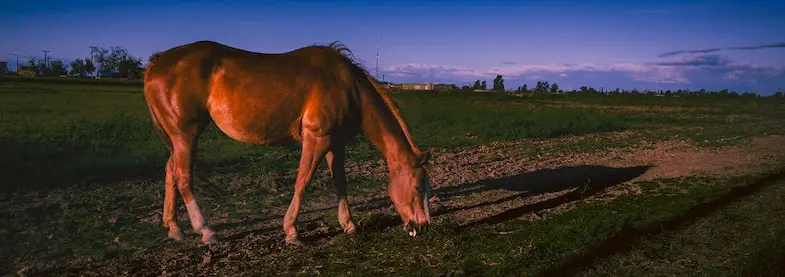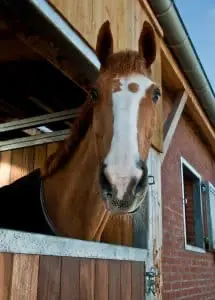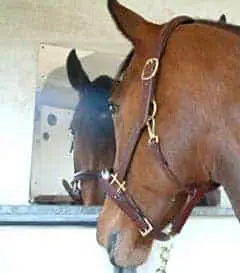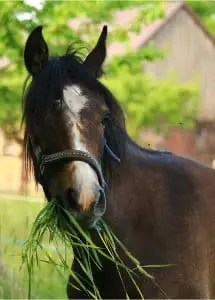We all want the best for our horses and where we keep them at night, whether stabled or turned out, is no different. The problem though is that, like so many things in life, everybody has their own opinion on what the best thing to do is which is why I thought I’d write this article. I thought it would be helpful to discuss all the options in an unbiased, balanced way, that way you can decide for yourself what is best for you and your horse(s).
Whichever option you choose it should be made purely on what’s best for your horse, some people think that turning a horse out at night will keep the cost of bedding down but if the pasture hasn’t recovered from the winter then he won’t have enough to eat. Likewise, a lot of people think that their horse will be happier stabled at night but if the stable is away from other horses then he’ll miss the company of others which again isn’t in his best interests.
Stabling horses at night
A lot of people think that it’s better to stable a horse at night, in part so that they can have a proper rest and get a good night’s sleep but is it really the best option for your horse? It can certainly be beneficial during the cold, wet winter months but that doesn’t mean to say that it’s always the best option.
What you need to consider before stabling your horse at night
If you’re going to stable your horse during the night then its important to make sure you’ve thought about the following:
Bedding
If you’re going to stable your horse overnight, even if you’re only doing so for part of the year, you need to think about what sort of bedding you’re going to use. Gone are the days when straw was pretty much the only option and new materials are being discovered all of the time. Rather than copy and paste something I’ve written elsewhere I thought it would be better to just link to the article I’ve previously written explaining all of the bedding materials along with the benefits and drawbacks to each of them.
Ventilation
Most people don’t consider ventilation when they think about stabling their horse and depending on the type of stable or stall you have it might not be an issue but it’s still important you make sure your horse has enough fresh air. Ideally, you want to have two open sources of air, such as the top of a split door and a window. As long as they’re on different sides this will allow the air to naturally flow through and reduce the chances of your horse developing a cough or respiratory inflammation. If your horse is kept in a multiple stall barn then you’ll need to make sure the sources of air are big enough to allow more air through.
Boredom
Some horses get very bored while being stabled so it might be worth thinking about some sort of boredom busting toy. I talked about a few of them in this article which you might find helpful but there are also a variety of other toys that have been designed to discourage boredom but also to encourage grazing. Something like a small horse ball feeder is one such example. It’s smaller than the horse rollers used for hay but still works in the same way, you place some healthy treats inside it then put it on the floor and when your horse rolls it around he’s rewarded with a tasty treat. This helps to alleviate his boredom and encourage grazing by rewarding him for playing with the toy.
Company
Horses are herd animals and can get very stressed if they can’t see other horses so ideally, it’s better for your horse if you can stable him so that he can see other horses. I know that this isn’t always possible but don’t worry if it’s not there are still things that you can do to stop your horse from feeling cut off from the rest of the herd. If he’s the only horse that’s stabled try and put him so that he can see other horses, even if they’re in a paddock it’ll help to reassure him that he’s not been left alone.
Another option that is great at fooling your horse into thinking he’s got company is to place a horse-safe plastic mirror on the wall, try it and I bet you’ll be surprised at how well it works! Your horse will see his reflection and presume that there’s another horse with him. The only caveat I would add though is that if your horse is protective over his food then don’t place the mirror to close to his feed – the mirror works so well that some horses have been known to literally fight themselves for their food.
Grazing
The natural way for a horse to eat is to graze with his head down, this is not only better for his digestion but research has shown that it’s also better for his stress levels. This is because when a horse is stressed his head is higher, so when he’s eating from say a haynet, he’s already in a stressful position.
While I know a horse can’t graze properly in a stable you can do things to help mimic this. When my horses are stabled I leave a corner without any bedding and then put some hay on the floor there so they can graze, although I know this isn’t so easy to do this if your horse eats his bedding. I also put their feed and water buckets on the floor so they don’t need to stretch to use them.
Drinking water
Don’t overlook your horse’s water just because he’s stabled, he may not be grazing but will still need plenty to drink during the night. I personally prefer to just use a water bucket rather than an automatic waterer but that’s me. They’re both great but need to be checked regularly – while you’ll need to make sure the waterer doesn’t have any leaks in the pipes you’ll also need to make sure the water buckets are topped up and don’t have any bedding in them.
Benefits of stabling a horse at night
Its often thought that turning a horse out at night is more natural so therefore has to be better for them but this isn’t always the case and stabling your horse certainly has its benefits. After all, if your horse is out during the night and the grass it rich he’ll be at a greater risk of putting on weight and would also be more likely to suffer from laminitis.
Horses that are stabled during the night are also less likely to suffer from ‘pasture’ injuries such as kicks, fencing and hedges.
Turning horses out at night
Turning your horse out at night, even if only for part of the year, certainly has its benefits but is it the best option for you and your horse? Just like people, all horses are different and while some of them are will be much happier turned out there are plenty of horses who would far rather be stabled.
What you need to consider before turning your horse out at night
Before you decide to turn your horse out at night there are a few things that you need to consider and take into account.
Security
Some horses seem to think the nighttime is the best time for them to try and escape so it’s important that you make sure all of the fencing is secure and repair (or replace) any sections that aren’t. It’s important to make the fence high enough so that your horse can’t jump it but also though enough so he can’t just break through it. I talked about different fencing materials in a recent article so I won’t cover it here, but if you want to read more about the various materials you can do so here.
If you’re turning your horse out at night you’ll also need to make sure your security is good enough to deter a possible thief. It’s a sad fact that some people will use the cover of darkness to attempt to steal not just horses but any livestock which is why security is so important. There are a number of options that can act as a deterrent from security lights to motion cameras and full 24-hour security cameras. I’ve covered them all in more detail here.
While every country has its own rules and regulations on it some form of ‘marking’ for your horse is a must, whether it’s a microchip, tattoo, freeze mark, or brand. They all work by giving your horse a unique mark or number which means that the horse can easily be identified, even if they’re hundreds of miles away from where they were stolen. This makes it much harder for a would-be thief to sell the horse on so will, therefore, may the horse less desirable to a thief.
Drinking water
Horses need plenty of fresh drinking water so it’s important to make sure they have enough water to last them throughout the night. If you have automatic waterers then you’ll need to make sure they’re all working properly and that none of the pipes have leaks. If, however, you don’t have automatic waterers then you need to make sure you either have multiple buckets full of water or a water trough. You’d be surprised just how much a horse can drink at night so it’s vital that you make sure it’s fully topped up before leaving him for the night.
Grazing
A horse’s digestive system is only able to digest small amounts of food at any one time so they need to spend a lot of time eating and in particular grazing, even at night time. It’s for this reason that you need to make sure your horse has enough grazing and that it’s of good enough quality to keep him healthy and free from digestive issues.
If you’re able to section the pasture off, this can help to maintain the quality of the grass. This will not only help you to keep to an effective worm management program but will also help to maintain the quality of the grass because you can alternate which area you’re using. This can be especially helpful if you’re planning on permanently turning your horse out at night rather than just doing so throughout the summer.
During the winter there isn’t as much grass which will impact not only on your horse’s diet but could also result in an eye injury. I know you’re probably wondering what I’m talking about but as there’s less grass around horses naturally start to look for extra food in other places and if you’ve got hedges with sharp branches your horse could hurt his eyes trying to get the food. To prevent this you might want to top up your horse’s grazing with hay, this will give him the food he needs and also stop him searching in the wrong places for it.
While it is, of course, important your horse has enough grazing at night it’s also important to make sure he does eat too much, some horses will use the nighttime as an opportunity to eat non-stop without interruption. If your horse does this then you might want to consider using a grazing muzzle during the night. This won’t prevent him from eating but will, instead, restrict the amount he can eat.
Blankets
Depending on where you live your horse may need some sort of rug while he’s turned out, even during the summer. This guide to blankets will explain the different rugs in more detail but as a general rule, you will probably need a turn-out blanket during the winter and may need a summer or flysheet when the weather is hot. You might think that flies are only active during the day but some, such as the mosquito, are very active at night.
Fly trap
If you do have a problem with flies during the night then on top of a fly sheet you might need to invest in a few other preventative measures such as a fly mask or fringe but also a fly trap. There’s a range of different traps on the market and they work in different ways, some use electricity or chemicals to catch the flies. Personally I prefer to go for the more natural traps that work by ‘luring’ the biting female in and then traps them. They do this by using a black ball that gives off the same infrared signature as a horse, the fly thinks its the perfect place to eat and lay eggs but when they realize they can’t they fly up to get away which is when they get caught in the trap. You can then empty the ‘catch’ and your horse won’t be bothered by the flies.
Rest time
This might sound like a really dumb thing to suggest if you want to turn your horse out but when the weather’s really hot do you have a shelter or stall you can bring him into. This will not only help him to cool down if he can get some shade but will also give him a chance to sleep if he’s not able to at night.
Benefits of turning a horse out at night
You might think that being around other horses is the main reason for turning horses out during the night but you might be surprised to know that there are a number of other benefits too. There are also health benefits to turning your horse out, for example, it’s known that horses that are stabled at night are more likely to suffer from coughs and inflammation of their airways. While not all horses will eat their bedding, doing so can increase the chances of them suffering from impaction colic.
As with every animal (and human), regular exercise is crucial and horses that spend the night outside are able to get more exercise than those that spend the night stabled. While this is more apparent if your horse is stabled for long periods of time, not just during the night, it can still make a difference to your horse.
Is it better to stable my horse or turn him out during the night?
A lot of people choose to do both, depending on the time of year. When the weather is cold and wet and the grass doesn’t offer much in the way of nutrition your horse may prefer to be warm and dry in a cozy stable. Whereas if the grass is nice and succulent during the warmer summer months your horse would probably prefer to be out in the open where he can eat the grass and will benefit from the fresher air.
Whatever you decide to do be flexible and make sure it’s in your horse’s best interests. Some horses don’t like being out during the night and can get very stressed. While others don’t like being shut inside for the night, they miss the company of other horses. If your horse is clearly unhappy change what you’re doing, its the best for your horse.
What do horses do during the night?
Unlike us horses don’t spend most of the night asleep instead they’ll only sleep for around 3 hours (in a 24 hour period) but that sleep will normally be in 10-minute blocks which makes you wonder what they do for the rest of the night?
In fact, horses do pretty much the same thing during the night as they do during the day, that is eat, sleep and interact with their friends. When they do sleep though a few horses will keep watch while the others will group together and have a little nap.
Further reading
- What’s the best bedding for my horse?
- Where should I keep my horse?
- How to feed a horse with no pasture
- How to feed a hard keeper on a budget
- Keeping a horse at home
- How to stop your horse getting bored
- How do horses sleep?
- Preparing your horse for the winter
- How to prepare for a hurricane
- Life hacks for horse owners
I hope you found this article helpful. If you did I’d be grateful if you could share it please as it would really help me.
Recommended products
Over the years I have tried hundreds of different horsey products, from various blankets and halters to different treats. Some I’ve loved, others I’ve hated but I thought I’d share with you my top all-time favorite products, the ones I never leave the yard without. I’ve included links to the products (which are in no particular order) that I really think are great.
- Horse Knots by Reference Ready – If you’re like me and enjoy pocket reference guides then you’ll love this knot tying guide. These handy cards can easily fit in your pocket or attach to the saddle for quick reference. They’re waterproof, durable and are color coded to make them easy to follow.
- Mane ’n Tail Detangler – Even if you never show your horse you’ll need to detangle his tail from time to time (and possibly his mane too) which is always a challenging chore! I’ve found that if I run a little bit of detangler through my horse’s tails every few days it stops them from getting matted up and makes combing them easy, even if they’re coated in mud. I don’t know if I should admit to this or not but it also works wonders on my hair.
- TAKEKIT Pro clippers – Over the years I’ve tried a lot of different clippers and while some were obviously better than others I found these to be by far the best. They are heavier than a lot of other clippers but for me, that’s a good thing, it makes them feel more sturdy and hardwearing. On top of that they have a range of speeds so are just as good for clipping your horse’s back as they are his face. I also like the fact that they come in a handy carry case but that’s not for everybody. The company that makes them is super good and incredibly helpful too, a real bonus these days. The only thing I wasn’t keen on was the fact that it doesn’t come with any oil, but that’s not a major problem as it’s not difficult to buy lubricant.
- Shire’s ball feeder – There are so many boredom buster toys out there but I like to use these every day, regardless of whether or not my horses are bored. I find that it helps to encourage my horses to problem solve by rewarding them with treats (or pieces of fruit) but it also mimics their natural grazing behavior which helps to keep them calm and de-stressed.
- Horse safe mirror – This is a strange one that many people are surprised about but I like to put horse safe mirrors in the trailers as well as in the quarantine stalls. It helps to prevent the feeling of isolation by giving the impression of other horses being around. Being herd animals horses can get extremely stressed when they feel that they’re on their own but with these stick-on mirrors, they believe that at least one other horse is with them.
- Rectal thermometer – I know this isn’t glamourous at all but it’s vital for your horse’s well-being to be able to check their temperature and a rectal thermometer is the easiest way of doing this which is why I’ve added it to the list.
Shopping lists
I’ve also put together a few shopping lists of essential items that I’ve found helpful over the years. I’ve broken the lists down into different categories rather than put everything in one massive list 😉





